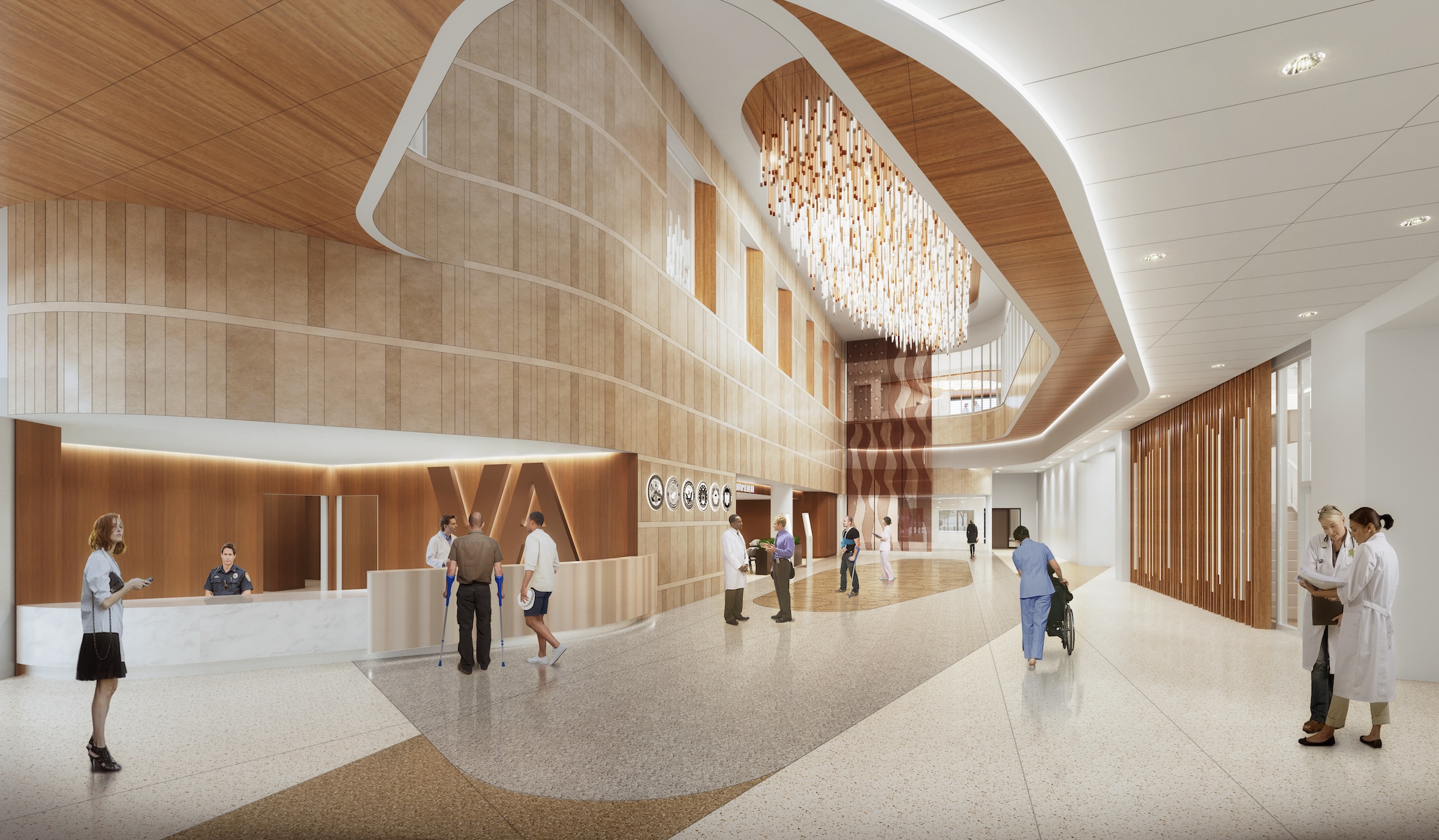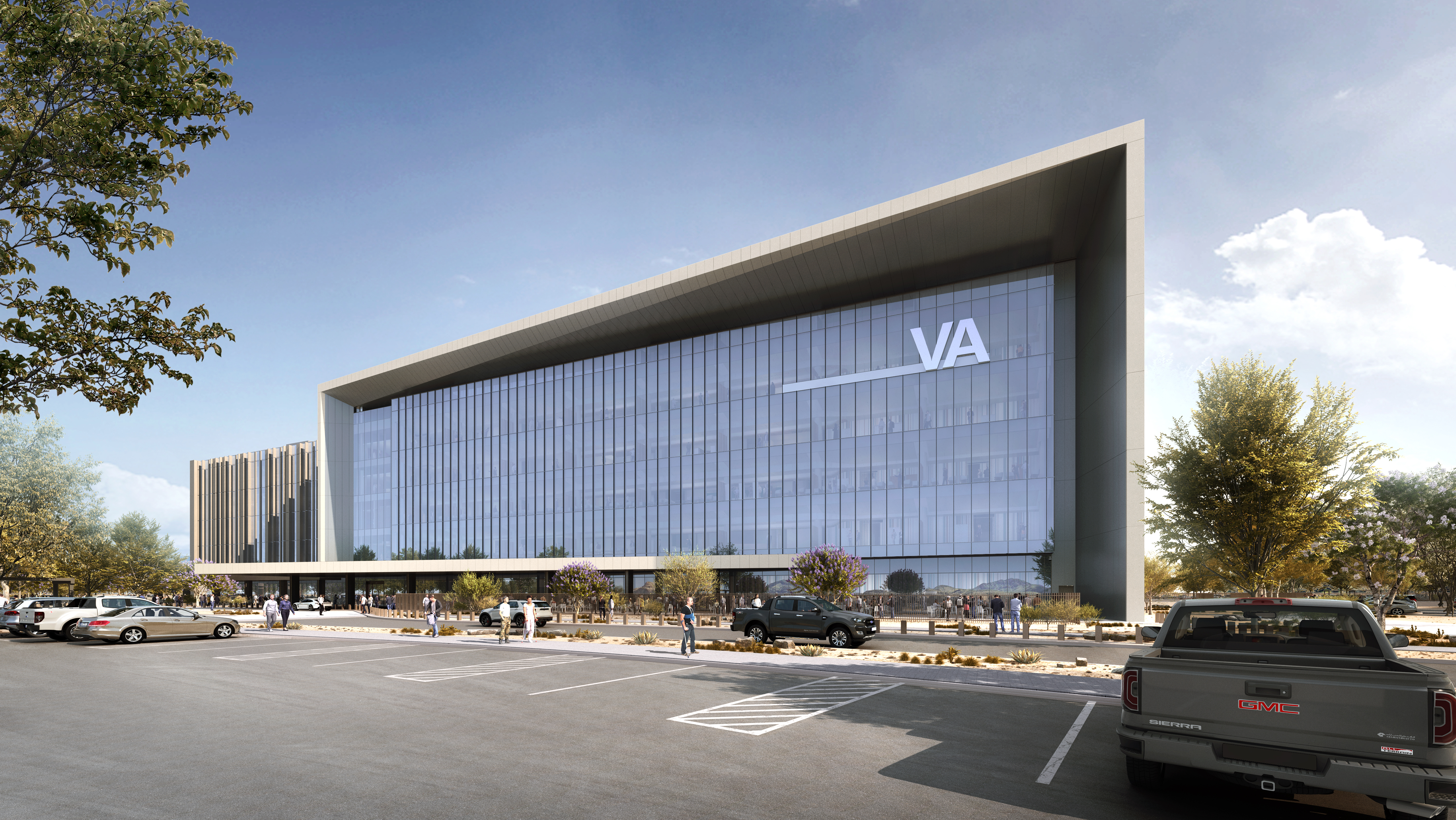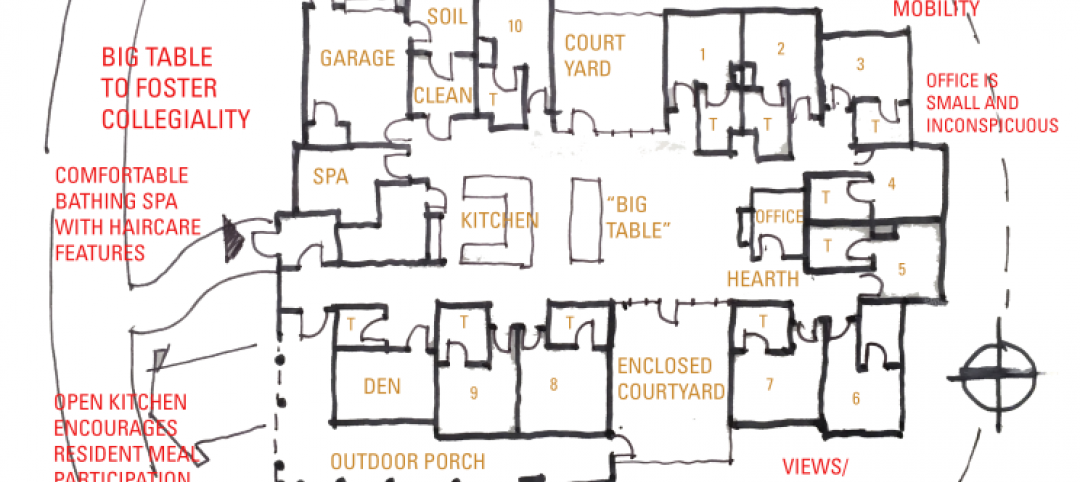A new 492,000-sf Veterans Administration ambulatory care facility on the William Beaumont Army Medical Center campus near El Paso, Texas will include 47 medical departments and provide brain and spinal cord injury treatment services. A design-build team of Clark Construction, SmithGroup, and HKS is spearheading the project that recently broke ground with anticipated completion in 2028.
The project will also include a new central utility plant and significant improvements to utilities, stormwater management, and parking facilities for the Fort Bliss campus. Public outdoor amenities bookend the entry canopy. To the northeast, an 18,000 sf healing garden, partially shaded by the building’s canopy, offers a tranquil space for respite. Toward the northwest, 6,500 sf of outdoor cafe seating connects to the interior canteen.
A 5,000-sf shaded staff plaza on the facility's south side connects the main staff entry to dedicated staff parking. Inside, a dynamic two-story lobby welcomes patients and their families with retail spaces and patient pharmacy flanking either side of the lobby. Radiology and pathology have dedicated spaces on either end of the first floor.
Interior design is inspired by the passage of the nearby Rio Grande River through the El Paso region. Soft, organic forms and curves at key points in the patient’s journey represent the fluidity of water, embodying the idea of renewal and regeneration on the path to good health. A rich, warm material palette inspired by the colors and textures of the desert and river trails grounds the interior design in the local community.

Indoor public spaces are oriented along the building’s northern façade to offer views of the nearby Franklin Mountains through an expansive glass curtain wall. Reception and waiting areas on each of the four clinical floors (levels 2-5) are also aligned along this northern façade to enjoy daylighting and views of the natural landscape, with staff workspaces and service spaces programmed behind clinical spaces along the southern spine of the building.
Audiology, prosthetics, and rehabilitation for traumatic brain and spinal cord injuries have dedicated space on level two, which also features specialty education rooms and administration spaces. The VA’s signature patient-aligned care team (PACT) clinics are on the third floor, with a specialized women’s clinic and spaces for mental health and substance abuse programs.
Level four features a dental suite, eye clinic, and surgical care to complement the ambulatory surgery unit and specialty ambulatory care (neurology, cardiovascular) on the fifth floor above. The sixth-floor penthouse features a north-facing outdoor staff terrace, administration space, and mechanical systems. The below-grade basement level of the health center contains back-of-house functions, including loading, laundry, engineering, and pharmacy.
The new health center is oriented to optimize environmental conservation and protection (solar, thermal, comfort, and wind), contributing to a goal of 30% energy reduction over prevailing building codes. Additionally, the building’s orientation forms a new campus entry and helps to minimize new parking areas on site, leaving a more natural landscape intact. Proposed arrays of photovoltaic panels above new parking areas will help to shade vehicles and generate energy on-site. The building is designed to exceed LEED Silver certification.
Owner and/or developer: U.S. Department of Veterans Affairs (VA)
Design architect: SmithGroup (interior); HKS (exterior)
Architect of record: SmithGroup + HKS Joint Venture
MEP engineer: Capital Engineering Consultants, Inc. (mechanical); Mazzetti (electrical)
Structural engineer: Cagley and Associates
General contractor/construction manager: Clark Construction Group
Related Stories
Healthcare Facilities | Jun 10, 2016
Top 10 health technology hazards include some influenced by space design
ECRI Institute’s annual list includes operational and workflow issues.
Healthcare Facilities | May 30, 2016
CBRE finds that investors are still flocking to healthcare sector
Over the past year, healthcare accounted for nearly one-fifth of all new jobs in the U.S.
Big Data | May 27, 2016
Analytics alone won't save money for healthcare facility owners
Advanced technology provides insight into the actions necessary to cut costs, but it's the people, processes, and implementation that make a difference with analytics, writes CBRE's Paul Oswald.
Hospital Design Trends | May 19, 2016
CannonDesign releases new white paper on advancements in operating room environments
"Surgical Suites: Emerging Approaches to Planning and Design" offers solutions for collaboration and technology integration.
Healthcare Facilities | May 6, 2016
Infographic: The greening of healthcare
By adopting green building and sustainable practices, healthcare facilities can save $15 billion over 10 years. Skanska's infographic spells it all out.
Healthcare Facilities | Apr 29, 2016
How improving emergency department design leads to greater hospital efficiency
Efficient ED operations result in shorter wait times, quicker diagnosis and care plans, maximum utilization of high-cost human and physical resources, and overall better patient experiences and patient satisfaction scores, writes CBRE Healthcare's Curtis Skolnick.
Healthcare Facilities | Apr 24, 2016
A symposium in New Jersey examines how a consolidating healthcare industry can better manage its excess real estate
As service providers position themselves closer to their communities, they are looking for ways to redirect non-core buildings and land for other purposes.
Senior Living Design | Apr 14, 2016
Creating a home for eldercare using the ‘Green House’ design concept
VOA Associates’ Douglas King offers design considerations in implementing the Green House concept in eldercare for continuing care retirement communities.
Adaptive Reuse | Apr 7, 2016
Redevelopment plan announced for Chicago’s historic Cook County Hospital
The century-old, Beaux Arts architecture-inspired hospital will transform into a mixed-use development.
Industry Research | Apr 7, 2016
CBRE provides latest insight into healthcare real estate investors’ strategies
Survey respondents are targeting smaller acquisitions, at a time when market cap rates are narrowing for different product types.
















